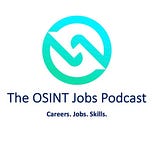Here’s one more episode from the vault, before we launch a brand new season of the OSINT Jobs podcast on October 11! Hang on to your hats, because we’ve got an inspiring slate of OSINT experts lined up to share their insights.
Now back to this week’s programming — in this episode, originally recorded in 2022, we spoke to Skip Schiphorst, a language-open source intelligence instructor at i-intelligence.
Below you’ll find lightly edited and condensed highlights from our conversation with Skip.
On using machine translation tools:
I use it to write. I use the auto translate key too whenever I have a long text even in a language that I'm okay at — just to save time, I'll translate to English. However, what I would suggest is always take everything with a grain of salt.
We've all been to restaurants anywhere in the world where you get these printed menus, and you think, “Okay, somebody used Google Translate.” That's the overreliance that we have on these tools and it's pretty funny when you see these menus. It's less funny when it's foreign policy, which gets totally misinterpreted.
On trying to tackle OSINT in a different language too quickly:
The common misconception that we have is that it's difficult, you need to be an expert, and you need to be an OSINT ninja. What I do throughout the week — I apply the methods of teaching I learned from others in the military — is taking a very slow crawl-walk-run approach. And the first day I really break the ice, just show that it's not that difficult.
Typing in the language is not so difficult. Extracting information, translating accurately is not so difficult. It just needs a bit of time and a couple of tools.
On searching the Chinese Internet:
Chinese is probably one of the easier languages to research online. I'm not saying that the Chinese language is easy. There are aspects of the Chinese language that are very difficult, for example, writing with the pen, which was fun at university for four years.
But in terms of research, since the grammar is fairly simple, there's no conjunctions or not a whole lot with verbs. It's actually a quite easy language to search in, especially when you compare that to languages such as French or Arabic which have very complicated verbs systems or Spanish — makes it a bit more complicated.
In general, when you do research in a foreign language or even in English, I would suggest staying away from verbs because they tend to complicate your research.
On learning digital literacy:
I started university a bit later, a lot later than most people at 34. What I did have is an old lady that took us by the hand to the librarian and said ‘this is the standalone computer, it will tell you where the books are in this library.’ Big fan of libraries, it’s important.
But what nobody did is tell us, ‘Hey, here's the digital library, also known as the internet, and this is how you search.’ Why is that?
If I would have known a couple of the operators — if I would have learned the QUOTATION MARK operator and the NOT operator during my studies, I would have cut my time in half, probably.
On not being afraid to make mistakes while learning a new language:
Everybody has a different way of learning and when it comes to languages, some people are fine with sitting in a library and just putting their face in a book and just learning vocabulary, vocabulary vocabulary.
I did four years of Chinese Studies at university. I think the best moment came when I really started making a lot of progress, when I was fortunate enough to spend some time in China, studying the language for three or four months. That's when I had to use it out of the library as well.
This is something I tell everybody. People are very scared to make mistakes, maybe because they’re a bit introverted. But learning a language there's room for error.
There's not a big deal if you make errors, unless you translate foreign policy papers. But having chit-chats, talking, making mistakes is how we learn a lot.
On the skills that make an OSINT applicant stand out:
If I would run my own cyber company, I would like to have some people that are really skilled in tech because that's the business you’re in. But I also find it very important to have people that know how to speak to somebody.
You don’t need to know a foreign language. Some people don't have a knack for foreign languages, that’s fine.
But I do think having something that adds to your cyber or IT toolkit, like the humanities or maybe social sciences, stuff like that.
If you're able to speak to people that helps so much, right? Even when you're writing your reports as an OSINT researcher. If you're only focused on getting the data, writing the data, but you’re not able to make that switch to try and translate the feeling and objective with the information you’re getting at, you’re missing out on a big section.
You can follow Skip on LinkedIn and X or check out his OSINT courses: "Searching the Chinese Internet" and "Searching the Arabic Web".











Share this post